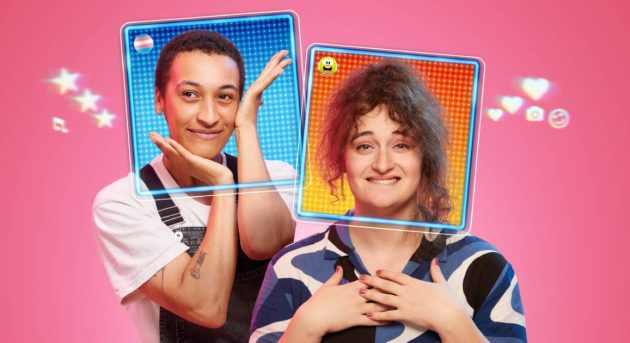Tabby Lamb chats HAPPY MEAL, making its Australian premiere as part of Sydney Festival
Set in the awkward online worlds of your Millennial youth, Happy Meal by Tabby Lamb is a warm, witty and nostalgic story of two young people transitioning from teens to adults, from MSN to Tik Tok, from cis to trans – and falling in love along the way.
Directed by Jamie Fletcher (Hedwig and the Angry Inch, Leeds/Manchester Production) with acclaimed performances by trans actors, and set design by Ben Stones animated with video projections by Daniel Denton, you’ll find yourself amid a vivid online world, IRL, captivated by two charismatic strangers on a journey to become who they always were.

Tabby Lamb is a non-binary writer and performer. Their debut solo show SINCE U BEEN GONE, which Tabby wrote and performed, premiered at the Edinburgh Fringe Festival 2019, after previewing at the Gate Theatre. The show was spectacularly received by audiences and garnered a glowing 4* write up from the Guardian who called the play “bold, honest and swollen with love”. Tabby is a BFI Flare x BAFTA Crew member 2021, an artistic associate for the Sky Arts Bursary at Stratford East, an associate writer with Middle Child and she’s on attachment at the Oxford Playhouse via their Playhouse Playmaker scheme 2021
What was your main inspiration for writing Happy Meal?
Tabby: I’d say there’s probably a few different ones. The main one was my previous show, Since U Been Gone, a solo show with a musician. As we got the train back from the very last show we did, we were talking about like what sort of things we want to see on stage and how trans representation on stage is changing and stuff, and they said, “Just once I want to see a show where one character turns to the other and says, ‘You were born in exactly the right body.'” They like came up with that line and that idea. So my brain just sort of started spiralling out, and all of these different ideas were came tumbling forward. I’m from like a tiny village in the middle of nowhere in the UK, so my childhood was spent like entirely online on Neopets and Habbo Hotel and everything [laughs]. So it’s sort of a combination of that conversation. I also wanted to write a show that trans people could watch without being triggered. That was one of the main things that I was thinking about. I want this to be as dramatic and as exciting as like a cis-written trans show, but I also want to consider all of the potential triggers and cliches and things that we can break up and show something. Especially in the UK, we’re in a really shitty place at the moment for trans representation and trans acceptance in the wider country and political sphere. So if these people can just come and see Happy Meal and just turn the blinkers off for an hour and be able to enjoy something, and not feel like they have to be on the lookout for anything dodgy or anything like that, that was really important to me. That it could be a bit of a respite and a bit of an escape from the unfortunately real world.
Why is it important to have a range of gender identities working on a show, especially if it’s about the queer and/or trans experience?
Tabby: Well, our show is about being trans, but it’s also about loving being trans. It’s about falling in love with yourself. And in order to accurately portray that, we needed to have people who understand that or who are going through that or who are learning about that. So it’s been really interesting with the variety of different voices that we get in the room, and the variety of gender identities that we have. A non-binary lighting designer, a trans-femme composer and music designer, a trans femme director, plus trans and non-binary trans people in the cast. Everyone sort of moves through the world differently – like we have fat trans people, we have trans people of colour, we have skinny white trans people, and everyone feels their gender in a different place and everyone represents their gender in a different place. And we wanted this show to be as universal as possible, so to have all of these different ideas and these different ways of presenting gender and presenting trans essentially just meant we could make a more truthful and well rounded show. Everyone who was walking into the rehearsal room knew that they weren’t going to be misgendered, they knew they were going to be safe and looked after.

Besides what we have already discussed, is there anything else that sets Happy Meal apart from other pieces of theatre?
Tabby: What’s quite fun about this show is that it’s all set on the Internet, The show opens and they’re on Club Penguin and they are penguins, so it’s ridiculous [laughs]. But it’s it sort of it eases you in [to the themes] as well. Let’s just show you some trans people being happy and then you’ll realise “Oh, shit, I’ve never seen anything with trans people being happy on stage.” It’s weirdly radical, and it’s something we don’t really see. There are trans people out there doing the work, making incredible work, but it’s not getting in front of audiences or it’s not making enough of a splash. And I think that’s what we’re trying to do, I guess, is to build that audience. I’m intrigued to see how it plays universally… like I don’t know anything about the experience of being trans in Australia, and I’m not going to pretend that I do. This isn’t a play about that, this is a play about British trans people and that hopefully will be interesting to Aussie trans people too.
Do you think the societal understanding of queer and trans people has shifted?
Tabby: I think it’s getting better, at least in a wider way. I think young queer people, young trans people are coming out easier. They’re coming out earlier. They’re facing less pushback from whether it’s educational establishment or whatever. When you look at trans media and trans stories, it can be quite scary. So, actually before the pandemic, I made a promise to myself that I wasn’t going to make any work that focused on queer trauma. I was going to focus on work that celebrated gender diversity, celebrated queerness, and centered gender euphoria. I think post-pandemic, we definitely need that even more because a more of us are trans now, because more of us came out, and we just need hope.
Why should audiences come and see Happy Ending?
Tabby: Whether you’re cis or trans, you want a happy ending, you want a smile. All of those lockdowns were so horrific that we just want something fun and light and fluffy. And that’s what Happy Meal disguises itself as. It feels fun and light and fluffy and silly and stupid, but then it sort of has this little undercurrent of “maybe treat people nicely and you won’t be a dickhead.”
Happy Meal premieres as part of Sydney Festival from January 17th.
For tickets and more information, visit the Sydney Festival website.




